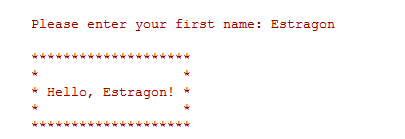为了美观,我们把输入和输出设计成如下:

#include <iostream> #include <string> int main() { std::string name; std::string s3,s2; std::cout << "Please enter your first name: "; std::cin >> name; s3 = "* Hello, " + name + "! *" ; std::string s1(s3.size(), '*'); std::string spaces(s3.size() - 2, ' '); s2 = "*" + spaces + "*"; std::cout << s1 << std::endl; std::cout << s2 << std::endl; std::cout << s3 << std::endl; std::cout << s2 << std::endl; std::cout << s1 << std::endl; system("pause"); return 0; }
这里运用到的方法:
1.string的构造函数 string(int size, char ch)。指定字符串的长度,字符串中所有字符设置为ch。
2.string::size()函数返回字符串的长度,不包含'�'。
3.string类中重载了 + 号。 直接 "something" + string 返回string类型。
课后习题:
1)下面的声明有效吗?
const std::string hello = "Hello"; const std::string message = hello + ", world" + "!";
有效。
2)下面的程序正确吗?
#include <iostream> #include <string> int main() { { const std::string s = "a string"; std::cout << s << std::endl; } { const std::string s = "another string"; std::cout << s << std::endl; } return 0; }
正确。 {}里面声明的变量,范围就是声明它的{}。所以可以在两个不同的{}{}中声明名称一样的变量。
3)下面的程序输出正确吗?
#include <iostream> #include <string> int main() { { const std::string s = "a string"; std::cout << s << std::endl; { const std::string s = "another string"; std::cout << s << std::endl; }} return 0; }
正确。输出和上一个程序一样。不同的是。在第二个{}里面。声明的s变量,覆盖了外部声明的s变量。
把倒数第三行的}}改成};}程序输出正确吗?
#include <iostream> #include <string> int main() { { const std::string s = "a string"; std::cout << s << std::endl; { const std::string s = "another string"; std::cout << s << std::endl; };} system("pause"); return 0; }
正确。和上一个例子不同的在于,第一个{}里面多了一个;的空白语句。
4)下面的程序正确吗?
#include <iostream> #include <string> int main() { { std::string s = "a string"; { std::string x = s + ", really"; std::cout << s << std::endl; } std::cout << x << std::endl; } return 0; }
不正确。x声明在第二个{}范围了。出了第二个{}范围,就不知道x是什么了。
修改如下,把x的声明放在第一个{}里面
int main() { { std::string s = "a string"; std::string x; { x = s + ", really"; std::cout << s << std::endl; } std::cout << x << std::endl; } system("pause"); return 0; }
5)下面程序输入 Samuel Beckett 预测输出?
#include <iostream> #include <string> int main() { std::cout << "What is your name? "; std::string name; std::cin >> name; std::cout << "Hello, " << name << std::endl << "And what is yours? "; std::cin >> name; std::cout << "Hello, " << name << "; nice to meet you too!" << std::endl; system("pause"); return 0; }
输入Samuel Beckett
输出:
What is your name? Samuel Beckett
Hello, Samuel
And what is yours? Hello, Beckett; nice to meet you too!